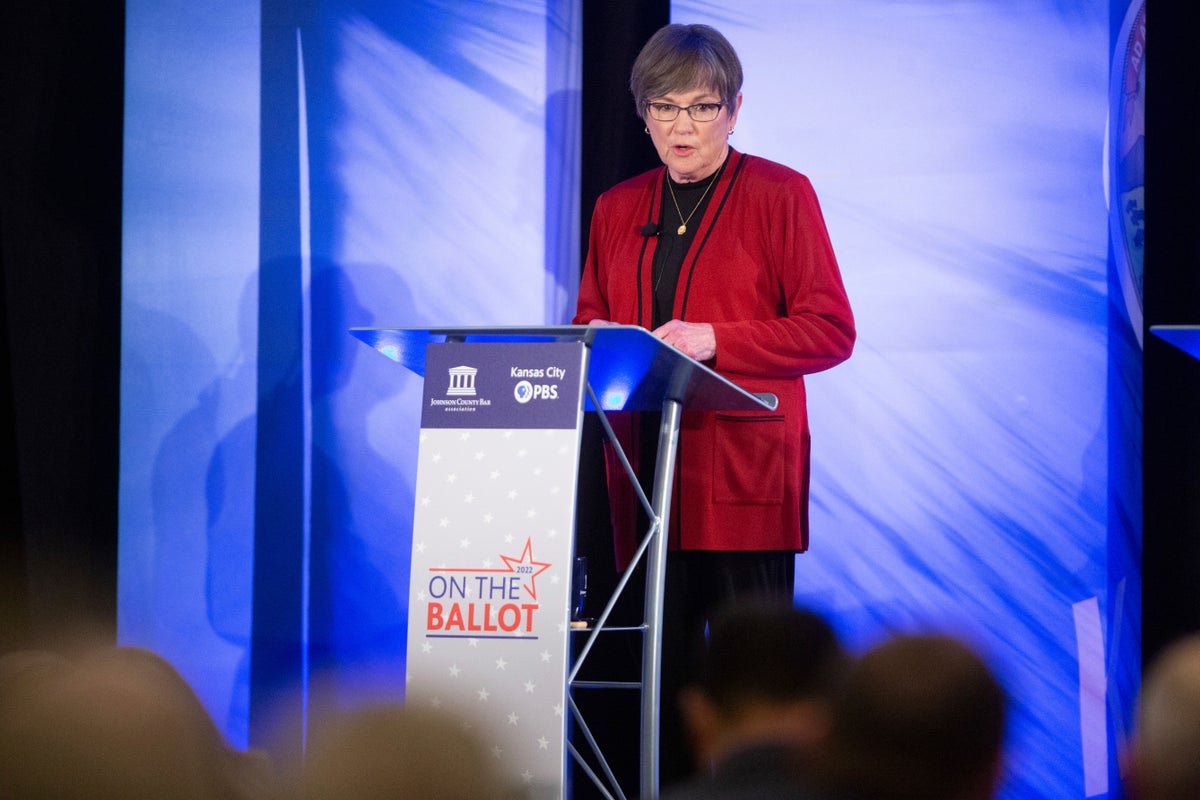
Kansas' Democratic governor is trying to reassert control over the education debate in a tough reelection race, bidding to regain her preferred focus on public school spending hikes during her term after Republican attacks over transgender athletes and what's taught in the classrooms,
Gov. Laura Kelly sought Wednesday to portray Republican challenger Derek Schmidt, the state's three-term attorney general, as a threat to adequate funding for public schools in their second and final debate. Kelly has branded herself as “the education governor” over her support for greater education spending.
But Schmidt has emphasized what he calls parents' rights, or making it easier for parents to challenge classroom materials and seek to remove books they find objectionable from libraries, a key issue. Schmidt's approach recalls a strategy that helped Republican Glenn Youngkin win over suburban parents and triumph in the 2021 governor's race in normally blue Virginia. He's also pounding on the incumbent, saying Kelly allowed students to be “locked out of schools” for months during the coronavirus pandemic.
Kelly, a target for the national GOP, takes credit for Kansas increasing its spending on K-12 schools enough to satisfy multiple state Supreme Court rulings in a lawsuit filed against the state in 2010. Schmidt has said that as governor he would ensure the state keeps spending enough money, but as attorney general, he defended past Republican school funding laws that the court declared insufficient under the Kansas Constitution.
“You know, I have a hard time being lectured by you on public schools,” Kelly told Schmidt during their debate in the Kansas City suburbs, sponsored by the local association for attorneys.
Kelly has tried to tie Schmidt to former GOP Gov. Sam Brownback, who launched a nationally notorious experiment in cutting state income taxes in 2012-13 that was followed by large, persistent budget deficits. Most of the experiment was repealed in 2017, and the state's finances have improved dramatically since.
Schmidt mocked Kelly's attempt to portray him as a clone of Brownback, saying, “The governor has an unhealthy obsession with her predecessor.”
In a wide-ranging debate, Schmidt also softened his previous opposition to legalizing marijuana for medical purposes, saying broad public support for it would lead him to back a narrow legalization law. Kelly supports medical marijuana.
Schmidt, who supported a proposed anti-abortion amendment to the Kansas Constitution that voters decisively rejected in August, challenged Kelly to name a restriction she would support. She didn't, saying only, “Women should have bodily autonomy equal with men.”
But education and school funding are potent issues, especially in vote-rich Kansas City suburbs that have used strong public schools to fuel economic and population growth.
The Republican Governors Association has tried to undercut Kelly's appeal to the middle with TV ads attacking her for vetoing two proposals to ban transgender athletes from girls' and women's school and college sports teams. Kelly later broadcast an ad in which she said she doesn't support men playing girls' sorts, leading Republicans to charge that she was lying about her record. She repeated that statement Wednesday, saying sports bodies can handle such cases.
Schmidt also criticized Kelly's for closing school buildings for the last two months of the 2019-20 school year to check the spread of COVID-19. He also attacked her veto of a proposed “parents' bill of rights” that would have made it easier for parents to challenge classroom materials and seek to remove books they find objectionable from libraries, such as LGBTQ-themed novels.
Schmidt has promised to sign such a measure and restrictions on transgender athletes within 100 days of taking office. “We can have a state that strongly supports public education — and puts parents and students first,” Schmidt said in his closing remarks.
Teachers, education groups and Democrats argue that parents already can object to classroom materials and library books. And Kelly allies had a news conference last week in Topeka to shift the conversation by questioning Schmidt's record on school funding.
When Brownback was governor, the state's basic aid per student to local schools remained almost flat for five years, starting in 2012-13, even as its total spending rose modestly to cover other expenses, including teacher pensions. Under Kelly, spending has grown almost twice as fast as under her Republican predecessors.
Increases in spending before Kelly took office in January 2019 were forced by Kansas Supreme Court rulings — as the court repeatedly rejected arguments from Schmidt's office that lawmakers were doing enough to meet their duty under the state constitution to finance a suitable education for every child.
“Everybody remembers what the state looked like four years ago," Kelly said.







